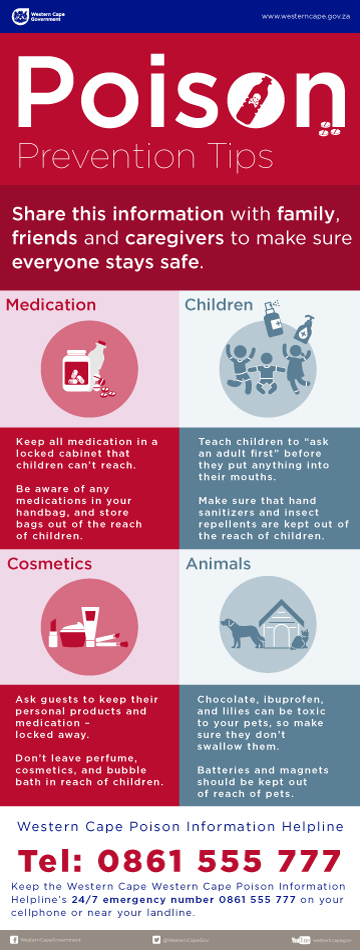Tips on how to prevent poisoning
Unintentional poisoning is very common. We need to be aware of harmful and dangerous chemicals, food, plants and animals in our environment so that we are better prepared to take care of our families.
Poison is anything that kills or harms through chemical actions. Most poisons are swallowed, either by drinking or eating. There are other ways poison can enter the body as well, such as by breathing, injection, venomous bites or stings, or touching enough of a substance that could cause illness or death.
Poison prevention tips:
Share this information with grandparents, family members, friends, caregivers and babysitters to make sure that everyone stays safe:
Keep the Poison Information Helpline 24/7 emergency number 0861 555 777 on your cell phone or near your landline.
- Teach your small children to "ask an adult first" before they put anything into their mouths.
- Keep all medicines, including herbal and homoeopathic medication, vitamins and minerals and over the counter medication in a locked cabinet where children can’t reach it.
- If guests bring medicines and other personal products, such as makeup and perfumes, into your home, you can also keep them in a safe place such as a locked cupboard.
- Don’t leave opened gifts such as perfume, bubble bath, button batteries, and alcohol unattended and in reach of small children.
- Make sure that you keep glasses containing alcoholic beverages away from children, or that they're emptied immediately after use.
- Various household products such as chocolate, ibuprofen, and lilies can be toxic to your animals and pets so make sure they don’t ingest it.
- Make sure that hand sanitizers and insect repellents are kept out of the reach of children.
- Button batteries and magnets should be kept out of reach of children and pets because they’re easy to swallow and can cause serious harm. Be on the lookout for button batteries in some toys and watches and make sure to keep an eye on children playing with these items.
- Look under beds and furniture for stray pills or foreign bodies. Keep medications and personal hygiene items such as mouthwashes out of the reach of children.
- Check your purse for potential hazards. Be aware of any medications or cosmetics that may be in your handbag. Store handbags out of the reach of young children.
What are the First Aid steps if a child is poisoned?
DO:
- Call 0861 555 777 – the Poisons Information Helpline - as soon as possible
- If something harmful has spilt on a child, remove the child’s clothing and wash the skin (and eyes, if affected) with plenty of fresh water for at least 15 minutes
- Move the child to fresh air immediately if a poisonous gas or smoke has been inhaled
- If the child is unconscious, gently turn them into the recovery position and tilt the chin upwards so that they can breathe freely, then call an ambulance.
DON’T:
- Don’t make the child vomit
- Don’t force a child to drink anything (even milk) but you may rinse the child’s mouth with water
What are the common poisons and how should they be treated?
|
ALL Medications |
|
|
The following household products and cosmetics may cause chemical burns in the mouth and throat:
|
|
|
Thinners or Paraffin |
|
|
Rat poison, Insecticides and Mothballs |
|
|
Plants or Mushrooms |
|
|
Button Batteries |
|



